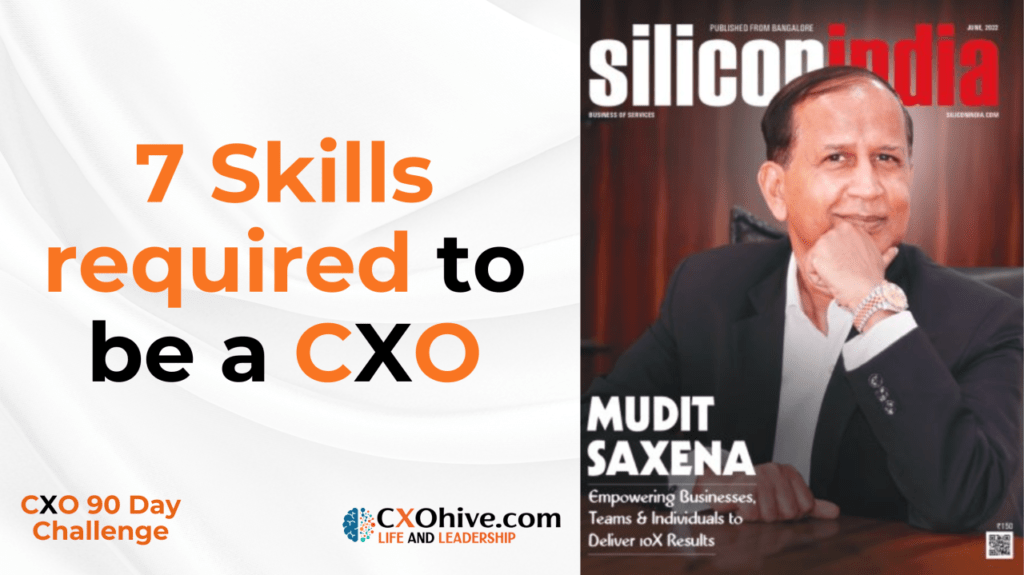7 Skills required to be a CXO

Are you a Mid-career manager aspiring to be a CXO ? then this article is for you. Congratulations on reaching where you are in your journey. You are now poised to take that leap into senior management but as you may know, a corporate career is like a pyramid and it keeps getting narrower as you move up. Everyone at your level has an education, works hard and is aspiring to get to the next level. So what is going to separate you from the rest? You need a “Sherpa” to guide you in your ascent to reach the pinnacle of your career. Someone who has climbed the corporate ladder himself and been a CXO himself. Someone who can help you with your blind spots and get you there quicker, so you avoid making mistakes. As a former CXO, a professionally certified (ICF-PCC) and John Mattone (coach to Steve jobs) certified executive coach I have helped thousands across the world and can help you too.
If you are a Mid career manager who is interested in becoming a CXO, click here to know more about the “CXO 90 day” Challenge : www.cxohive.com/midcareer
As a Mid-career manager you may be wondering what is required to become a CXO. Besides the right mindset, there are numerous skills that all effective leaders possess, but they also have to possess unique qualities that set them apart from others.
Here are 7 skills that are required to be a CXO. This not an exhaustive list but enough to get you thinking.
- Functional Competence in at least one area.
- Problem-solving skills.
- Ability to think outside the box.
- Communication skills.
- Team and relationship building.
- Strategic Leadership skills.
- Analytical skills.
Do you have the skills? Are you ready to be a CXO?
Do the free CXO quiz : https://bit.ly/3qvWqAA
1. FUNCTIONAL COMPETENCE (in at least one area)
Functional competencies are determined by the tasks and commitments employees make to a certain position. An aggregate of 3 to 5 functional skills are ascribed to a specific job, depending on the complexity and amount of responsibilities of the position as well as the maturity of the employment environment. Tata Sons Chairman N. Chandrasekharan first made his name as a software programmer before focusing on cultivating client relationships. His ascent to the top was sparked by this, which led to bigger roles.
Mary Barra, the chairman and chief executive officer of General Motors, began her career in the engineering department of the auto industry. This gave her the credibility she needed to take on more responsibility in the areas of product innovation and distribution network.
2. PROBLEM SOLVING SKILLS

To solve problems effectively, you don’t need to be particularly brilliant. These skills must be honed via practice and discipline. In general, the capacity to successfully handle and discover answers for challenging and unexpected situations is referred to as problem-solving.
This requires strong attention to detail along with analytical, creative, and critical thinking abilities. This enables one to recognise issues as they develop and pinpoint the best fixes without delay. Additionally, identify the causes and variables that may be responsible for the issue and implement adjustments to lessen such problems in the future.
Problem solving is the fundamental competency of the twenty-first century, according to leaders like Eric Schmidt, the former chairman and CEO of Google. According to the Yale School of Management professor Barry Nalebuff, “Great strategic problem solving is a crucial tool, one whose worth is only increasing.”
3. ABILITY TO THINK OUTSIDE THE BOX
Simply said, thinking outside the box implies being open to new approaches and strategies for achieving your goals. If you have a narrow perspective, the world might seem quite little. Thinking beyond the box may broaden your viewpoint, giving you a clearer understanding of the events and developments in your profession (and in life). Be more receptive to a range of other viewpoints, possible solutions, willing to examine alternate points of view and working methods.
4. COMMUNICATION SKILLS

The most crucial life skill is probably the ability to communicate effectively. The basic ability to write (emails, memos, reports etc) and speak to inspire or express a point of view separates leaders from the rest of the pack.
Are you aware that Jeff Bezos of Amazon prefers to have a 2 page memo that he and his senior team reads in a meeting before discussing an issue (No power point slides, believe it or not!).Indra Nooyi( Ex CEO pepsi) was renowned for her ability to simplify difficult issues into understandable concepts and convey them to a wide audience.
5. TEAM AND RELATIONSHIP BUILDING
With a globally connected world and information being available to everyone, leaders have to learn how to build relationships, collaborate and build high performing teams.
The most successful CEOs are not only good team players; they also understand how teams function and how to maximise the benefits of the group.Sundar Pichai is viewed as a people’s guy because of his modest demeanor and composure. He strongly believes in supporting others’ success ,emphasises the need of having faith in others’ intentions and supporting them as they thrive.
6. STRATEGIC LEADERSHIP SKILLS

As you go up the ladder your ability to think strategically is what distinguishes you from your peers. To be able to plan, anticipate and prepare the organisation for future growth is critical for leaders.
Tiff Macklem, Dean of Rotman university , stated in a recent interview that “Successful boards need to spend time for longer term strategic thinking,” but all too often “The squeaky wheel gets the most oil”—constant pressure from analysts and regulators draws boardroom attention away from strategy.
7. ANALYTICS SKILLS
The capacity to gather information and evaluate it in-depth are analytical skills. It’s the ability to solve problems and come to a decision using the knowledge gained from available data.
Making judgments based on trends detected, gathering and analysing data, integrating new knowledge, and brainstorming ideas to reach the ideal decision.
If you are a Mid career manager who is interested in becoming a CXO , click on the link to know more : www.cxohive.com/midcareer
Date
February, 12 2021


Leave a Comment